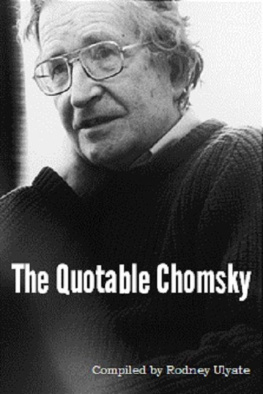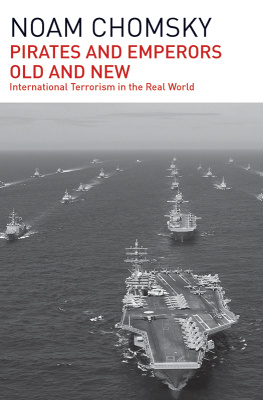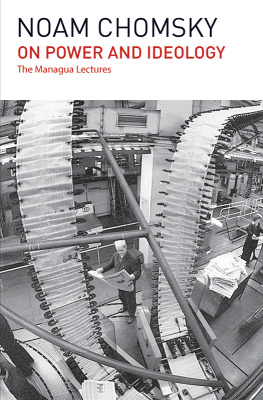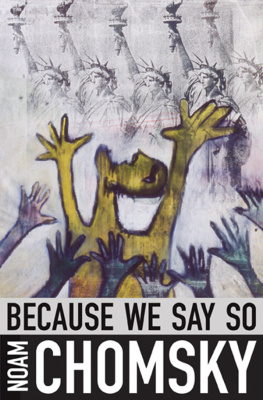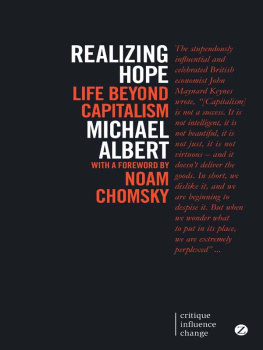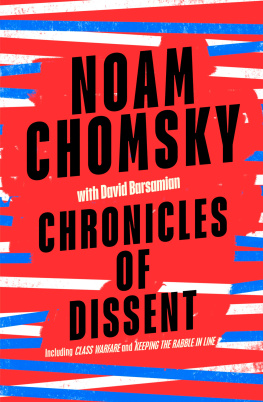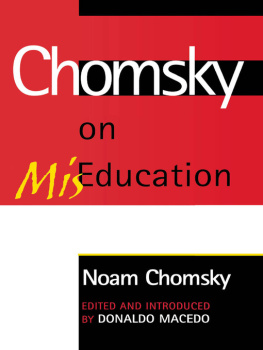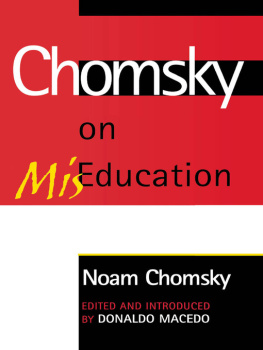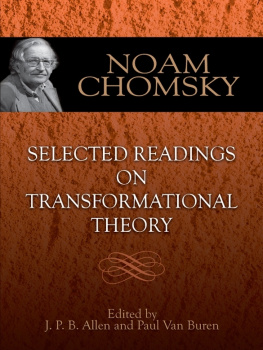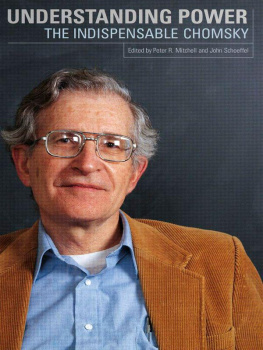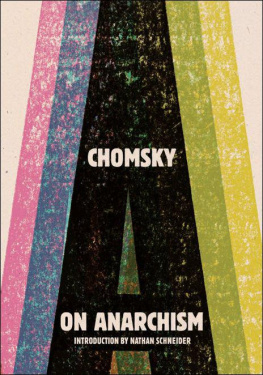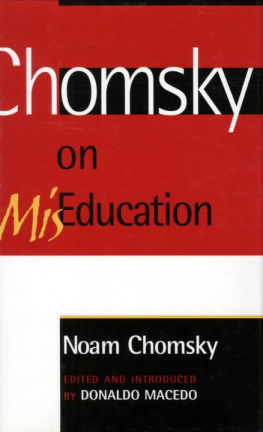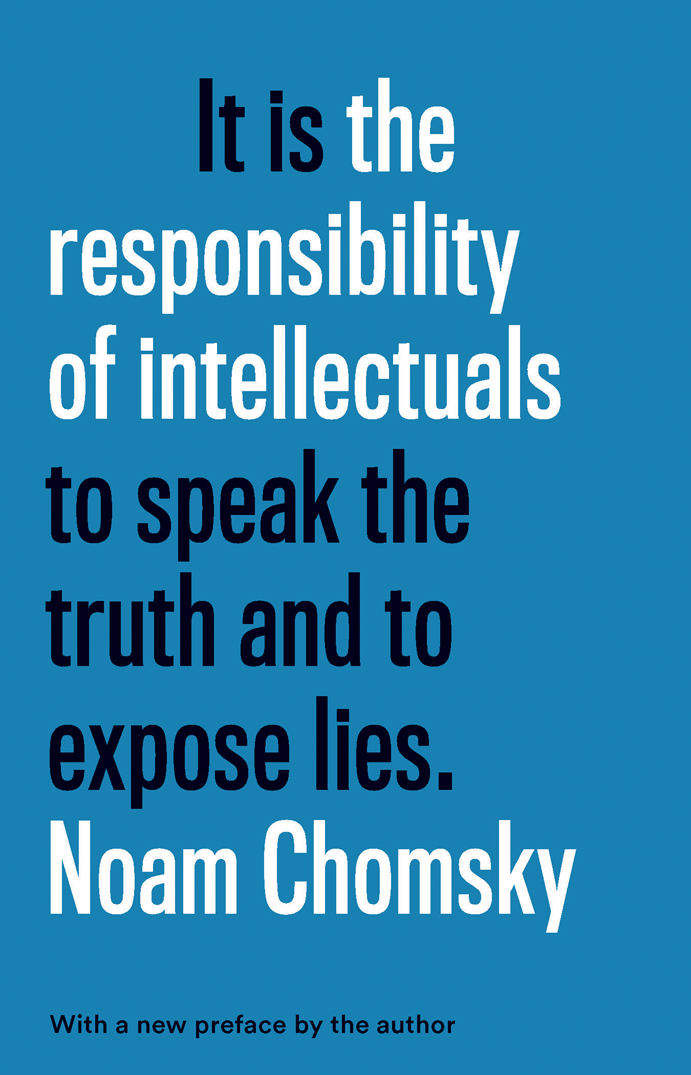
ALSO BY NOAM CHOMSKY
Because We Say So
The Chomsky-Foucault Debate
The Essential Chomsky
Failed States
Gaza in Crisis
Hegemony or Survival
Hopes and Prospects
How the World Works\
Imperial Ambitions
Making the Future
Masters of Mankind
9-11: Was There an Alternative?
Occupy
On Anarchism
Power Systems
Understanding Power
What Kind of Creatures Are We?
What We Say Goes
Who Rules the World?

2017 by The New Press
Preface 2017 by L. Valeria Galvao-Wasserman-Chomsky
All rights reserved.
No part of this book may be reproduced, in any form, without written permission from the publisher.
Page 143 constitutes an extension of this copyright page.
Requests for permission to reproduce selections from this book should be mailed to: Permissions Department, The New Press, 120 Wall Street, 31st floor, New York, NY 10005.
Published in the United States by The New Press, New York, 2017
Distributed by Perseus Distribution
ISBN 978-1-62097-364-6 (e-book)
CIP data is available
The New Press publishes books that promote and enrich public discussion and understanding of the issues vital to our democracy and to a more equitable world. These books are made possible by the enthusiasm of our readers; the support of a committed group of donors, large and small; the collaboration of our many partners in the independent media and the not-for-profit sector; booksellers, who often hand-sell New Press books; librarians; and above all by our authors.
www.thenewpress.com
Book design and composition by Lovedog Studio
This book was set in Sabon
Printed in the United States of America
10 9 8 7 6 5 4 3 2 1
Contents
Table of Contents
Guide

The concept of intellectuals is a rather curious one. Who qualifies?
The question arises in an instructive way in Dwight Macdonalds classic 1945 essay The Responsibility of Intellectuals. The essay is a bitter and sardonic critique of distinguished thinkers pontificating about the collective guilt of German refugees who were barely surviving in the ruins of wartime disaster. He contrasts their self-righteous contempt for the miserable survivors with the reaction of soldiers of the victorious army, who recognize the humanity of the victims and sympathize with their plight. The former are intellectuals, the latter not.
Macdonald ends his essay with simple words: It is a great thing to be able to see what is right under your nose.
What of the responsibility of intellectuals? Those who qualify for the title have a degree of privilege conferred by this status, yielding opportunity beyond the norm. Opportunity confers responsibilitywhich, in turn, poses choices, sometimes hard ones.
One choice is to follow the path of integrity, wherever it may lead. Another is to put such concerns aside, passively adopting the conventions instituted by structures of authority. The task in the latter case, then, is to carry out faithfully the instructions of those who hold the reins of power, to be loyal and faithful servants, not after reflective judgment but by reflexive conformism. That is a fine way to evade the moral and intellectual difficulties of challenge and to escape what can be painful consequences of seeking to bend the moral arc of the universe towards justice.
The alternatives are familiar. Thus we distinguish the commissars and apparatchiks from the dissidents who confront the challenge and face the consequenceswhich vary, depending on the nature of the society. Many dissidents are well-known and rightly honored, and their harsh treatment is rightly denounced with fervor and outrage: Vclav Havel, Ai Weiwei, Shirin Ebadi, and a distinguished list of others. We also rightly condemn the apologists for the evil society, who offer at most tepid criticism of mistakes of rulers who they routinely describe as benign in intent.
Others are missing from the list of honored dissidents, for example, the six leading Latin American intellectuals, Jesuit priests, who were brutally murdered by Salvadoran forces fresh from renewed training by U.S. forces, acting on the specific orders of the U.S. client government. In fact, they are scarcely known at all. Few even know their names, or recall the events. The official orders to murder them have yet to appear in the United States anywhere near the mainstream, not because they are secret: they were published prominently in the mainstream Spanish press.
This is not an exception. It is the rule. The facts are not in the least obscure. They are well-known to activists who protested the horrendous U.S. crimes in Central America, and to scholarship. In the Cambridge History of the Cold War, John Coatsworth writes that from 1960 to the Soviet collapse in 1990, the numbers of political prisoners, torture victims, and executions of nonviolent political dissenters in Latin America vastly exceeded those in the Soviet Union and its East European satellites.
When we turn to coverage in media and intellectual journals, we find that the picture is reversed. To take one of many striking illustrations, Edward Herman and I compared the New York Times coverage of the murder of a Polish priestwhose assassins were quickly found and punishedwith the murder of one hundred religious martyrs in El Salvador, including Archbishop scar Romero and four American churchwomen, whose assassins were long concealed, while the crimes were denied by U.S. officials and the victims subjected to official contempt. The coverage of the murdered priest in an enemy state vastly exceeded that of one hundred religious martyrs in the U.S. client state, and was radically different in style in the way predicted by a propaganda model of the media. This is only one illustration of a highly consistent pattern over many years.
One choice is to follow the path of integrity, wherever it may lead.
To be sure, there might be some explanation other than service to power. Occasionallyvery rarelythe facts receive some notice, accompanied by an effort to explain them away. In the case of the religious martyrs, an alternative explanation was offered in a derisive response by the distinguished U.S. journalist Nicholas Lemann, national correspondent of the liberal Atlantic Monthly: the discrepancy can be explained by saying the press tends to focus on only a few things at a time, Lemann writes, and the U.S. press was most focused on Poland.
Lemanns explanation is easily tested by a look at the New York Times index, which shows that in the relevant period coverage of the two countries was virtually identical, a little higher for El Salvador. But in an intellectual environment of alternative facts, details like this hardly matter.
In practice, the honorific term dissident is reserved in practice for dissidents in enemy states. The six murdered Latin American intellectuals, the archbishop, and the many others like them in U.S. client states who protest state crimes and are therefore murdered, tortured, or imprisoned are not termed dissidents (if they are mentioned at all).


